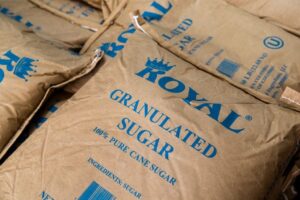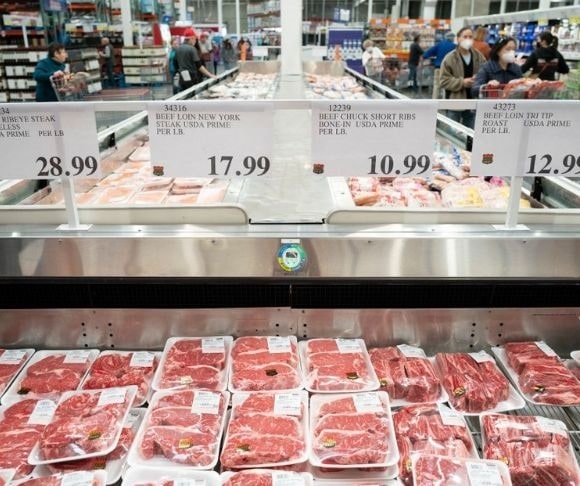Is there hope on aisle nine? Not really. The only thing in that part of the grocery store is persistent food inflation. The latest consumer price index (CPI) provided tepid relief for families who eat their dinners at home in front of the television instead of the neighborhood restaurant that plays loud and obnoxious music: Food at home rose 8.4%, and food away from home advanced 8.8%. Although this is the second consecutive month of US food prices touching single-digit territory, the pain at the checkout counter is still being felt by consumers nationwide. But the federal government anticipates that the growth rate in food prices will slow or even decline this year.
Food Inflation in America
The annual food inflation rate will be in the range of 4.9% and 8.2% this year, above the 20-year historical average of 2.8%, according to the US Department of Agriculture (USDA). Supermarket prices are expected to rise between 4.4% and 8.8% in 2023, which is also higher than the two-decade historical average of 2.5%, the USDA stated in its Food Price Outlook. Here is a breakdown of some of the key components of the monthly USDA report:
- Meats: -2.5% to +5.5%
- Fish and Seafood: -1.0% to +4.2%
- Eggs: +5.1% to +32.9%
- Dairy: +1.1% to +8.9%
- Fruits and Vegetables: -1.2% to +5.0%
- Sugar and Sweets: +7.6% to +12.6%
Over the last two years, US consumers have faced a barrage of challenges regarding the food supply, from higher prices to shortages. The cost of a carton of eggs spiked. Families endured a baby formula shortage. Lettuce and potatoes became scarce items. In the coming months, shoppers should brace themselves for higher sugar, orange juice, and strawberry prices.
Concentrate on Orange Prices
Orange juice futures have been the top-performing commodity in global financial markets in 2023, rallying nearly 40% year-to-date to $2.83 per pound. Over the last 12 months, orange juice has soared more than 62%. The increase has been driven by US production collapsing to the lowest level in 86 years after the USDA reported that domestic output is forecast to be 2.57 million metric tons, or 62.25 million boxes, for the 2022-2023 marketing season. This is down 23% from last year. Brazil, the world’s largest orange producer, is also contending with heavy rains that are weighing on output volumes.
Sugarflation Is Too Sweet

(Tom Williams/CQ-Roll Call, Inc via Getty Images)
For the first time since September 2011, sugar prices are trading above 26 cents on the US ICE Futures exchange. The front-month contract is up 30% year-to-date and has surged about 38% over the last 12 months. The primary factor for sugar has been the weather, with multiple commodity agencies trimming their forecasts for key producing markets, including Brazil, India, China, Pakistan, and Thailand. But market analysts also note that higher energy and labor costs are exacerbating price pressures. Of course, when sugar prices are higher, it impacts products that contain the agricultural commodity, from beverages to condiments to baked goods. In other words, get ready for potential sticker shocks.
Inflation Is Not Strawesome
The price of a dry pint of strawberries has decreased considerably since late last year, tumbling from $3.856 in December to $2.649 in February. But it is still up nearly 12% from before the coronavirus pandemic. That said, the respite might be short-lived as industry experts warn that shortages are expected in the coming months. In addition, heavy rainfall in California, hot temperatures in Mexico, and production in Florida coming to an end will send prices higher. But market observers note that this could be avoided if weather conditions allow farmers to extend the growing season.
Got Beef?
So far, beeflation has yet to be revived, with the CPI subindex falling 1.9% year-over-year and dipping 0.3% month-over-month. But market experts think it is only a matter of time before beef and veal prices will spike again. The data are pointing to growing beef demand, shrinking cattle herds, and accelerating input cost pressures. As Liberty Nation reported, “Beef and veal prices had been on a downward trend in recent months, thanks to farmers liquidating their supplies prematurely due to surging animal feed, labor, and utility costs. They will need to rebuild their herd again, which will take plenty of time.”
A Dire Situation
Food inflation might be the real crisis that Americans are experiencing every day. Surveys have found that consumers’ higher grocery bills have had the biggest effect on their budgets. More households are turning to credit cards, buy-now-pay-later services, dollar stores, and food banks to put meals on the kitchen table. Some blame it on the weather, while others argue it is all Russian President Vladimir Putin’s fault. The real culprit? The government. Because of their response to the coronavirus pandemic, politicians and bureaucrats manufactured two situations. The first was an astronomical injection in the units of currency flowing through the economy, requiring more paper to purchase the same amount of goods. The second was shutting down the economy and disrupting the marketplace, creating a ripple effect in every sector. The United States was not and never will be like Lebanon or South Sudan. But families are witnessing the steady erosion of their purchasing power.




